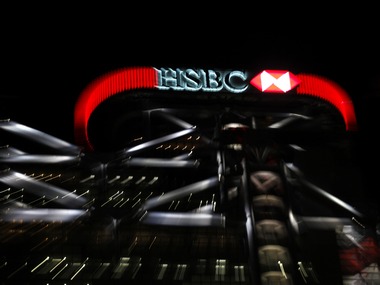Global companies are rebalancing their growth strategies, given the fact that emerging markets are showing more promise than the richer economies.
Global consumer companies like Unilever and P&G are looking at India and China as core markets in their quest for growth. They are now being followed by the banks. The latter are paring down their services to rich countries as consumption there slows down.
[caption id=“attachment_74490” align=“alignleft” width=“380” caption=“The bank is looking to expand in India by acquiring the assets of UK’s Royal Bank of Scotland (RBS). Tyrone Siu/Reuters”]  [/caption]
HSBC, the bank that claims to be the world’s largest “local bank”, has agreed to sell its credit card business in US for $ 2.6bn. It is looking for buyers for its Canadian stockbroking business. The bank has announced an ambitious plan in May 2011 to cut costs by $ 3.5bn each year mostly by selling retail assets in the developed world.
In contrast, it is raising money through bonds denominated in Chinese renminbi to fuel growth in China. In India, HSBC employs over 34,000 people. Its worldwide restructuring and job cuts will, therefore, have a limited impact on India.
The bank is looking to expand in India by acquiring the assets of UK’s Royal Bank of Scotland (RBS) and is talking to Indian regulators to set up a 100 percent subsidiary, according to Naina Lal Kidwai, country head for India and director of HSBC Asia. In an interview to Mint newspaper, she expresses concern that the banking sector is not able to grow faster to meet the demands of India’s hungry corporate sector.
The bank is also growing the retail business in India, she added. For six months to June 2011, the retail business reported a loss of $ 4m. Kidwai is not really concerned about that as the bank continues to grow its retail loan book in India by expanding the credit card business.
Impact Shorts
More ShortsHSBC estimates that China will account for 20 percent of global GDP and India will contribute 7 percent by 2050. In a presentation to investors in May 2011, the bank outlined the focus on the two growth markets.
In a strange admission, HSBC’s India CEO Stuart Davis complained about losing talent to local banks in India and also about wage inflation. According to a report in Bloomberg, he said that this was unheard of earlier. This perhaps goes to show why the pressure to build the business in markets like India is high.
In HSBC’s interim management report released last month, the bank reported over $ 450m in pre-tax profit. The bank’s profit before tax in India may rise to $1 billion by 2013, according to Davis.


)

)
)
)
)
)
)
)
)



